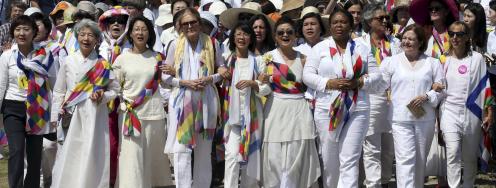3 Million Cups of Tea?
It has been two years since North Korea set off its second nuclear test, and nearly as long since an American official has been to the Hermit Kingdom.
Fortunately, this week a U.S. government delegation is visiting Pyongyang. Ambassador Robert King, the Special Envoy for North Korean Human Rights Issues, is in the DPRK along with several other U.S. officials to conduct an on-the-ground assessment of the reported food supply crisis. The team will return with some conclusions about the severity of the situation and whether – and how – the U.S. would respond.
The fact that an official U.S. delegation is visiting is in and of itself a good thing. History clearly shows that when the U.S. and the North are talking – however distasteful that is to some – it keeps bad things from happening. When we are not engaged North Korea finds a way to make trouble. Victor Cha, a former hard line Bush Adminstration National Security Council official with responsibility for North Korea, recognized this tendency in recent congressional testimony, “Never once in the (last 27 years) was there a period in which the DPRK provoked in the midst of negotiations involving the U.S.”
This particular visit can go one of at least three ways. One would be some conclusion that the situation is not dire enough to merit U.S. aid and therefore we won’t provide any. The political result would be a diplomatic cold shoulder to the North that may play well in Peoria and Seoul, but would actually worsen the already bad U.S.-Pyongyang dynamic. Anyone for a third nuclear test?
Another path would be a finding that the need is great and that we can provide help – but only if North Korea agreed to monitoring stipulations that they are unlikely to accept. That would give Washington the moral high ground and paint the DPRK as the spoiler. Again, no help on moving things forward diplomatically or improving the regional security situation. The only points scored would be political.
A third way would be a finding that the need is indeed great and have Washington be prepared to be flexible on the conditions that apply to aid. Why not ask the North what it would see as reasonable rather than serve them with non-negotiable demands? There is room to maneuver when it comes to the issue of monitoring aid, and we should use it.
It would be truly useful if Ambassador King returned not only with a finding but also with news of an mutually agreed arrangement that would facilitate rapid food supply for the people of North Korea. Not only would this help human beings in need and re-establish a useful avenue of communication, but it just might be the first step toward productive re-engagement with the North.
The fastest road to Pyongyang’s nukes may just be through its people’s stomachs.




